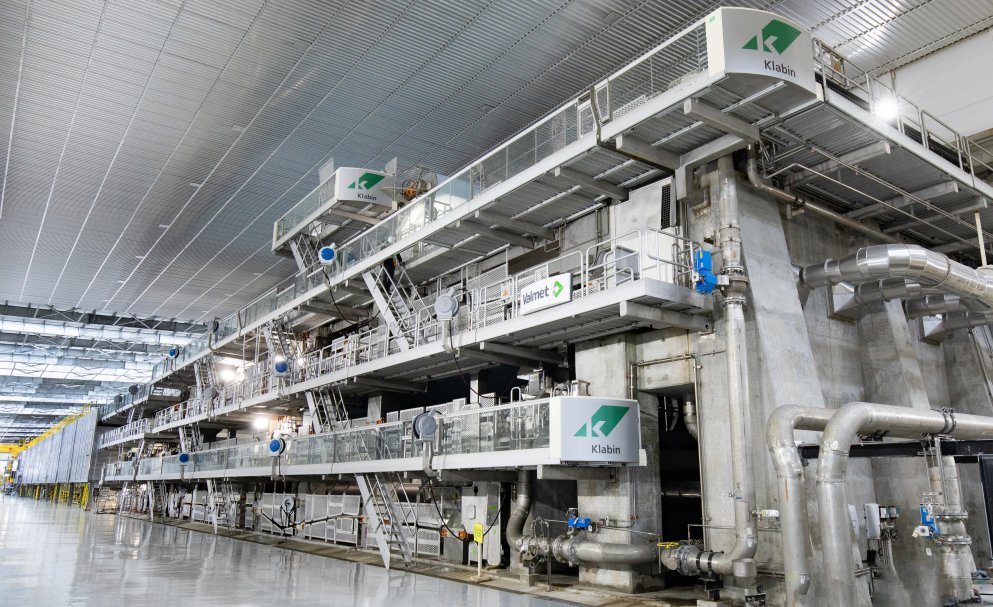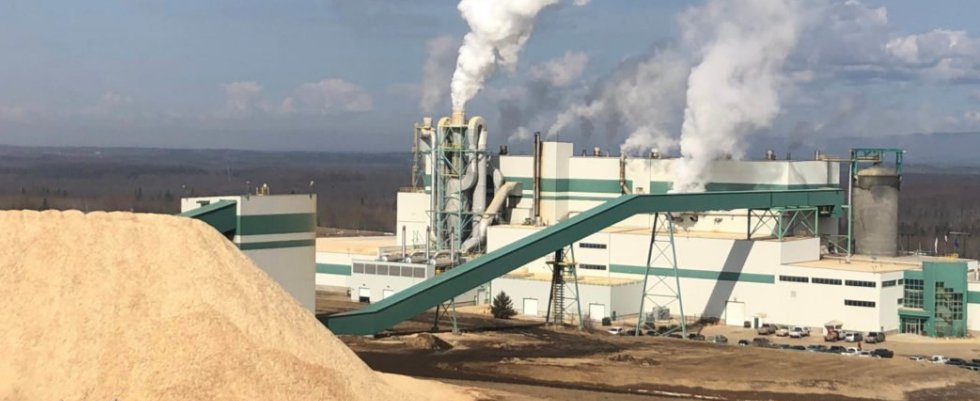|

Klabin Holds Inauguration Ceremony for Puma II in Paraná, Brazil
Sept. 26, 2023 - Klabin on Sept. 21 held an inauguration ceremony for its Puma II — a project that marked the expansion of the Puma Unit in Ortigueira, Paraná, Brazil.
According to Klabin, the Puma II project is the largest investment in the company's history and the largest private investment ever made in the State of Paraná. With an investment of R$12.9 billion, Klabin installed two new paper machines — MP27 and MP28 — which are both in operation and have a combined production capacity of 910 thousand tons per year of packaging paper grades.
The inauguration was attended by members of the board of directors, management and employees of Klabin, customers, suppliers, business partners, communities, press and authorities. The Governor of the State of Paraná, Ratinho Junior, and the Mayor of Ortigueira, Ary Mattos, as well as local authorities, attended the ceremony, which began with a guided tour of the new machines.
Puma II Project
Announced in 2019, the Puma II Project is part of Klabin's biggest growth cycle in its 124-year history. The first phase, completed in August 2021, included the construction and start-up of Paper Machine 27 (MP27), which manufactures the innovative Eukaliner®, the world's first kraftliner paper made 100% with eucalyptus fiber.
Two years later, in June this year, there was the startup of the Paper Machine 28 (MP28), the second of the Project, which focuses on the production of paperboard. The equipment also symbolizes Klabin's debut in the white paperboard market, reinforcing the expansion of its product portfolio.
Together, the two machines increase Klabin's annual production capacity to 4.7 million tons of paper and cellulose.
“Conceived more than ten years ago, with the construction of the Puma Unit, between 2013 and 2016, the completion of the Puma II Project marks a new decade of growth for Klabin,” said Francisco Razzolini, director of Industrial Technology, Innovation, Sustainability and Projects at Klabin. “We significantly increased our production capacity, entered new markets and employed cutting-edge technology to raise the quality of our products and boost the company's sustainable development.”
Regionally, the two phases of the Puma II Project generated more than 33 thousand direct and indirect jobs. In addition to encouraging partner companies to hire local workers, Klabin also valued labor by investing in technical training in the communities of Ortigueira and Telêmaco Borba, in Paraná.
Between 2013 and 2023, the Puma Unit received the largest investments in Klabin's history, adding 2.5 million tons per year to the company's total production volume.
Sustainable Production
For the Puma II, the company invested in a series of initiatives that use innovation as a sustainability lever, such as the biomass gasification plant project, which allows one of the factory's lime kilns to operate 100% fossil fuel-free, reducing greenhouse gas emissions. In this sense, currently, 98% of the waste generated in the operation of Puma II is reused.
In another example, the innovative potassium sulfate plant treats ash generated in the recovery boiler that results in a substance used in the formulation of fertilizers.
Currently, the Puma II unit has 96% renewable fuels in its energy matrix. There is also a sludge drying plant, responsible for processing biological and tertiary sludge generated at the plant's effluent treatment stations. Klabin noted that with a capacity of up to 17 thousand tons/month, this will be the first system in the world to dry sludge generated in tertiary effluent treatment. The dry sludge can be mixed with biomass to become fuel for the power boilers.
Logistics in Paraná
In parallel to the development of the Puma II Project, Klabin set up a robust logistics operation in order to facilitate the flow of production for export. Next to the Ortigueira factory, a container terminal was built for road and rail transport with the capacity to transport 125 thousand tons of cellulose and paper in containers per month to the Port of Paranaguá in Paraná.
In addition, the company also began operations at the Klabin Port Terminal (PAR-01), located on the commercial pier of the Port of Paranaguá. With the capacity to receive one million tons of cellulose and paper per year, PAR-01 is part of the logistics investment package made by Klabin in the State in recent years. The operation consolidates Klabin's logistics strategy in Paraná, bringing even more competitiveness, flexibility and sustainability and guarantees excellent logistics between forest, factory and port.
With the completion of the second phase of Puma II, Klabin estimates it will move 2.2 million tons of paper and cellulose per year via Paranaguá.
SOURCE: Klabin |
|
|

West Fraser to Sell Two Pulp Mills in Western Canada to Atlas Holdings for $120 Million
Sept. 22, 2023 - West Fraser Timber Co. Ltd. and Atlas Holdings today announced the signing of a definitive agreement for the sale of West Fraser's Quesnel River Pulp mill in Quesnel, British Columbia and its Slave Lake Pulp mill in Slave Lake, Alberta to Atlas. Atlas owns and operates several pulp, paper and wood products businesses in Canada and the United States.
The agreement announced today includes related woodlands operations and timber holdings in Alberta and a long-term fibre supply agreement for the Quesnel River Pulp facility.
Upon closing of the transaction, the Quesnel River and Slave Lake pulp mills will be operated by Millar Western Forest Products, which joined the global Atlas family of manufacturing and distribution businesses in 2017. Millar Western is a more than 100-year-old Canadian forest products company headquartered in Edmonton with existing pulp mill operations in Alberta, establishing a strong foundation and a bright future for the Quesnel River and Slave Lake pulp mills.
Combined total cash proceeds from the sale are US$120 million.
"We believe this transaction provides these two great assets and teams a strong strategic future while allowing West Fraser to focus our resources on our objective to be the premier wood building products company in North America," said Ray Ferris, West Fraser's President & CEO. "Atlas Holdings and Millar Western bring deep experience in the pulp sector, and we look forward to continuing to work together as a key fibre supplier to Quesnel River Pulp."
"This transaction will provide the dedicated and skilled teams at Quesnel River and Slave Lake with a solid future. Our team intends to continue investing in these high-quality mills and we look forward to collectively strengthening our product offerings and value proposition to the global BCTMP marketplace," said David Anderson, CEO of Millar Western.
"Millar Western is highly respected as a leader in wood products in the region and beyond and we look forward to welcoming the Quesnel River and Slave Lake mills to the Atlas family of companies," said Atlas Partner Neil Mahajan.
The transaction is anticipated to close following successful completion of customary regulatory reviews and satisfaction of customary closing conditions. West Fraser will provide a further update during its third quarter results conference call.
TD Securities Inc. is acting as exclusive financial advisor and McMillan LLP is acting as legal advisor to West Fraser. Davies Ward Phillips & Vineberg LLP is acting as legal advisor to Atlas.
About Atlas Holdings
Headquartered in Greenwich, Connecticut and founded in 2002, Atlas and its affiliates own and operate 27 companies, which employ more than 50,000 associates across 300 facilities worldwide. Atlas operates in sectors such as automotive, building materials, capital equipment, construction services, food manufacturing and distribution, metals processing, packaging, paper, power generation, printing, pulp, supply chain management and wood products. Atlas' companies together generate approximately $16 billion in revenues annually.
West Fraser is a diversified wood products company with more than 60 facilities in Canada, the United States, the United Kingdom, and Europe. From responsibly sourced and sustainably managed forest resources, the Company produces lumber, engineered wood products (OSB, LVL, MDF, plywood, and particleboard), pulp, newsprint, wood chips, other residuals, and renewable energy.
SOURCE: West Fraser Timber Co. Ltd. |
|

Metsä Group Says Logistics Solution is Ready for New Kemi Bioproduct Mill
Sept. 6, 2023 - The new logistics solution designed for Metsä Group's bioproduct mill in Kemi, Finland, is ready to serve the mill’s transport needs. The solution includes a new logistics road on Sahansaarenkatu leading to the mill site, an electrified private track to the mill and the warehouse in port of Kemi in Ajos.
"The new logistics solution is based on ensuring safety, delivery reliability and quality. Together with our partners, we have built a complete logistics solution to ensure a seamless supply chain from the forest to the mill and from the mill to the customers," says Pasi Pulkkinen, Logistics Director of the Kemi bioproduct mill project.
Two thirds of the new mill’s wood will be transported by rail, using the new private track. The transports are powered by VR’s latest engines. Vectron electric locomotives can handle loads as heavy as 2,500 tonnes, which means approximately 20–25 per cent more wood per train. All in all, more than 400 wagons will be used for the Kemi bioproduct mill’s rail transports, and the fleet is assigned exclusively to these transports. Traffic infrastructure and related improvements have been addressed from the project’s outset, and they have been designed jointly with the Finnish Transport Infrastructure Agency and VR. The mill’s private track enables wood transports with electric locomotives all the way to the mill.
Truck traffic to the mill will use the new Sahansaarenkatu logistics road, the improvements to which have been carried out by the City of Kemi. The private track and the new logistics road have been built so that they do not intersect with other traffic, which will significantly improve traffic safety in the surrounding area.
All exports from the new mill will be concentrated in the port of Ajos in Kemi, where Metsä Fibre has built a new 37 000 m2 product warehouse. In the port warehouse, the pulp bales will be handled by electric forklifts and an electric harbour crane. The transport of pulp from the mill to the port of Ajos is handled by Kuljetusliike Kalevi Huhtala Oy. The loading and unloading of pulp bales into trucks is done automatically with equipment designed for the mill's needs. The specially designed trucks used for the transports are fuelled with biodiesel.
In the harbour, the draught has been increased to 12 metres to allow the use of larger vessels and more efficient sea transport. The draught of the harbour basin is the responsibility of Kemin Satama Oy and the draught of the seaway is the responsibility of the Finnish Transport Agency.
Pasi Pulkkinen, the project's logistics director, praises the cooperation with the partners as really smooth.
"Efficient logistics is one of the basic prerequisites for the mill’s operation. In the logistics solution, we have demanded efficient and low-emission solutions from our partners. Through good cooperation, we have created a highly functional and safe solution, which we will implement together with our selected partners," says Pulkkinen.
About Kemi Bioproduct Mill
The Kemi bioproduct mill will produce some 1.5 million tonnes of softwood and hardwood pulp per year, as well as many other bioproducts. It will also produce 2.0 TWh of renewable electricity per year, which equals to roughly 2,5 percent of Finnish total electricity production and together with Äänekoski bioproduct mill roughly 5 per cent. The new mill will replace the current pulp mill in Kemi, which has reached the end of its lifespan.
SOURCE: Metsä Group |
Canfor Pulp Reports Results for Second Quarter of 2023
 July 28, 2023 - Canfor Pulp Products Inc. (CPPI) today reported its second quarter of 2023 results. July 28, 2023 - Canfor Pulp Products Inc. (CPPI) today reported its second quarter of 2023 results.
Overview
- Q2 2023 reported operating loss of $38 million; net loss of $28 million, or $0.44 per share
- Significant deterioration in global pulp market fundamentals throughout the quarter driven by record high pulp producer inventory levels and weak global pulp demand
- Completed closure of pulp line at Prince George Pulp and Paper mill
- Subsequent to quarter-end, a labour dispute at British Columbian ports resulted in transportation bottlenecks and a short curtailment at the Company's Northwood NBSK pulp mill
The Company reported an operating loss of $37.9 million for the second quarter of 2023, compared to an operating loss of $25.2 million for the first quarter of 2023. After taking into consideration a net $6.9 million inventory write-down in the current period, the Company's adjusted operating loss was $31.0 million for the second quarter of 2023, compared to an adjusted operating loss of $21.6 million for the first quarter of 2023. These results, for the most part, reflect the impact of substantial global pulp pricing declines in the current quarter driven by elevated global market pulp producer inventory levels and weak global softwood pulp demand.
In January 2023, the Company announced the decision to restructure its operating footprint to align its manufacturing capacity with the long-term supply of economic residual fibre and, as a result, in April 2023, the Company wound down and permanently closed the pulp line at its Prince George ("PG") Northern Bleached Softwood Kraft ("NBSK") Pulp and Paper mill. In connection with this closure, the Company's Intercontinental NBSK pulp mill ("Intercon") was successfully converted to provide slush pulp to its specialty paper facility. The combined impact of these operating structure changes is a reduction of approximately 280,000 tonnes of market kraft pulp production annually.
Commenting on the Company's second quarter of 2023 results, CPPI's President and Chief Executive Officer, Kevin Edgson, said, "Following our difficult decision to permanently close the pulp line at the Prince George Pulp and Paper mill, we had a smooth and efficient wind down of the pulp line and an effective transition of slush pulp supply to our paper machine. We want to thank our employees for their unwavering commitment to safety along with their determination, dedication, and resilience to continue to strive for improved operating performance and reliability.
"Financially, this was a challenging quarter for the pulp business as declining global pulp market conditions weighed heavily on results. While we continue to navigate the current external challenges facing our pulp business, including the ongoing weak global pulp market fundamentals, we greatly appreciate our employees' continued efforts in navigating through these difficult conditions."
Global softwood pulp market fundamentals and pricing experienced considerable pressure during the second quarter of 2023 as tepid global demand was combined with rising global softwood pulp producer inventory levels. As a result, NBSK US-dollar list prices to China dropped sharply throughout the quarter to end June at a low of US$648 per tonne.
For the current quarter overall, US-dollar NBSK pulp list prices to China averaged US$668 per tonne, down US$223 per tonne, or 25%, from the previous quarter. Prices to other global regions experienced less pronounced declines in the current period, with the average US-dollar NBSK pulp list price to North America at US$1,510 per tonne (before discounts), down US$165 per tonne, or 10%, from the prior quarter.
Global softwood pulp producer inventories climbed substantially throughout the current quarter and, at the end of May 2023 were significantly above the balanced range at 54 days of supply, an increase of five days from March 2023. (Market conditions are generally considered balanced when inventories are within a normal range of 32-43 days of supply).
Pulp production was down 17% from the previous quarter, mainly due to the aforementioned operating platform changes, and, to a lesser extent, operational challenges at the Company's Northwood NBSK pulp mill in the current period.
Operating income in the Company's paper segment was $0.7 million, down $2.6 million from the previous quarter, as a reduction in slush pulp costs, linked to lower Canadian dollar NBSK pulp market prices, was more than outweighed by a decrease in paper production and shipments as a result of a scheduled maintenance outage completed in the current period, as well as higher energy costs quarter-over-quarter.
Looking Forward
Looking forward, global softwood kraft pulp markets are anticipated to remain challenging through the third quarter of 2023, as record high global pulp producer inventory levels are projected to continue to be met with weak global pulp demand, particularly for paper and writing grades. In addition, the traditionally slower summer months are anticipated to further soften global pulp demand, particularly in the short-term. The Company will continue to monitor the challenging market conditions and will adjust operating rates, if appropriate, through the balance of 2023.
The labour dispute at the Ports of Vancouver and Prince Rupert that commenced on July 1, 2023, put pressure on a constrained logistics network in British Columbia. As a direct result, with pulp mill inventories at capacity, the Company curtailed its Northwood pulp mill in July for approximately one week, with an estimated 10,000 tonnes of reduced NBSK pulp production.
Results in the third quarter of 2023 are also forecast to reflect a scheduled maintenance outage at Northwood in September, with a projected 25,000 tonnes of reduced NBSK pulp production, as well as higher associated maintenance costs and lower projected shipment volume. As part of this outage, the Company will complete an inspection of its assets at this facility, including the two recovery boilers, with the intention of formulating a re-investment plan for Northwood's recovery boiler number one ("RB1"), as well as the facility as a whole, that is focused on optimizing this mill for the long-term.
Bleached kraft paper markets are anticipated to weaken through the third quarter of 2023, particularly in the North American markets, as tepid demand is combined with above-average paper inventory levels.
Canfor Pulp Products Inc. (TSX: CFX) is a leading global supplier of pulp and paper products with operations in the central interior of British Columbia. Canfor Pulp owns and operates two mills in Prince George, BC with a total capacity of 780,000 tonnes of Premium Reinforcing Northern Bleached Softwood Kraft Pulp and 140,000 tonnes of kraft paper.
SOURCE: Canfor Pulp Products Inc. |
|

Thunder Bay Pulp and Paper Acquires Thunder Bay Mill from Resolute
Aug. 1, 2023 - Atlas Holdings today announced the closing of the previously announced acquisition of the pulp, newsprint and directory paper mill operations in Thunder Bay, Ontario, from Resolute FP Canada Inc. by Atlas' affiliate, Thunder Bay Pulp and Paper Inc.
Thunder Bay is a leading northern bleached softwood kraft and northern bleached hardwood kraft pulp, paper, newsprint and directory producer. The mill has been a landmark in northwestern Ontario for more than a century.
Kent Ramsay, who has served as General Manager of the Mill since 2019, has been named President of Thunder Bay Pulp and Paper.
"The Atlas team has been working hand-in-hand with our local team to prepare for this day as we begin the next chapter of this Mill's storied history," said Ramsay. "I am proud to continue to lead this team and work with Atlas to stand up the Mill as a thriving, self-sufficient pulp and paper operation and continue our legacy as a hallmark of the Thunder Bay community for many years to come."
Atlas also announced the appointment of paper and packaging industry executive Randy Nebel as Chairman of the Thunder Bay Pulp and Paper Board of Directors. Nebel has extensive experience in the pulp and paper sector, having previously served as President and CEO of Verso Corporation, and President of Longview Paper & Packaging.
Most recently, Nebel has served as Chairman of the Board of Crown Paper Group, which Atlas acquired in October 2022.
"The Board is looking forward to guiding Thunder Bay Pulp and Paper in this new era for the business," said Nebel. "Our deep experience across the pulp and paper industry and time spent supporting businesses with Canadian operations will provide the right foundation and guidance for Thunder Bay as we continue to be a trusted employer as well as a reliable partner to our customers, suppliers, and the Thunder Bay community."
In a press statement, Resolute said that it will continue to operate its sawmills and woodlands operations in Northwestern Ontario. With the closing of the transaction, the parties have entered into certain ancillary agreements, including a long-term woodchip and biomass supply agreement pursuant to which Resolute will continue to provide chips and biomass to the Thunder Bay mill.
Thunder Bay Pulp and Paper is a leading northern bleached softwood kraft and northern bleached hardwood kraft pulp, paper, newsprint and directory producer.
SOURCE: Thunder Bay Pulp and Paper |
|
|